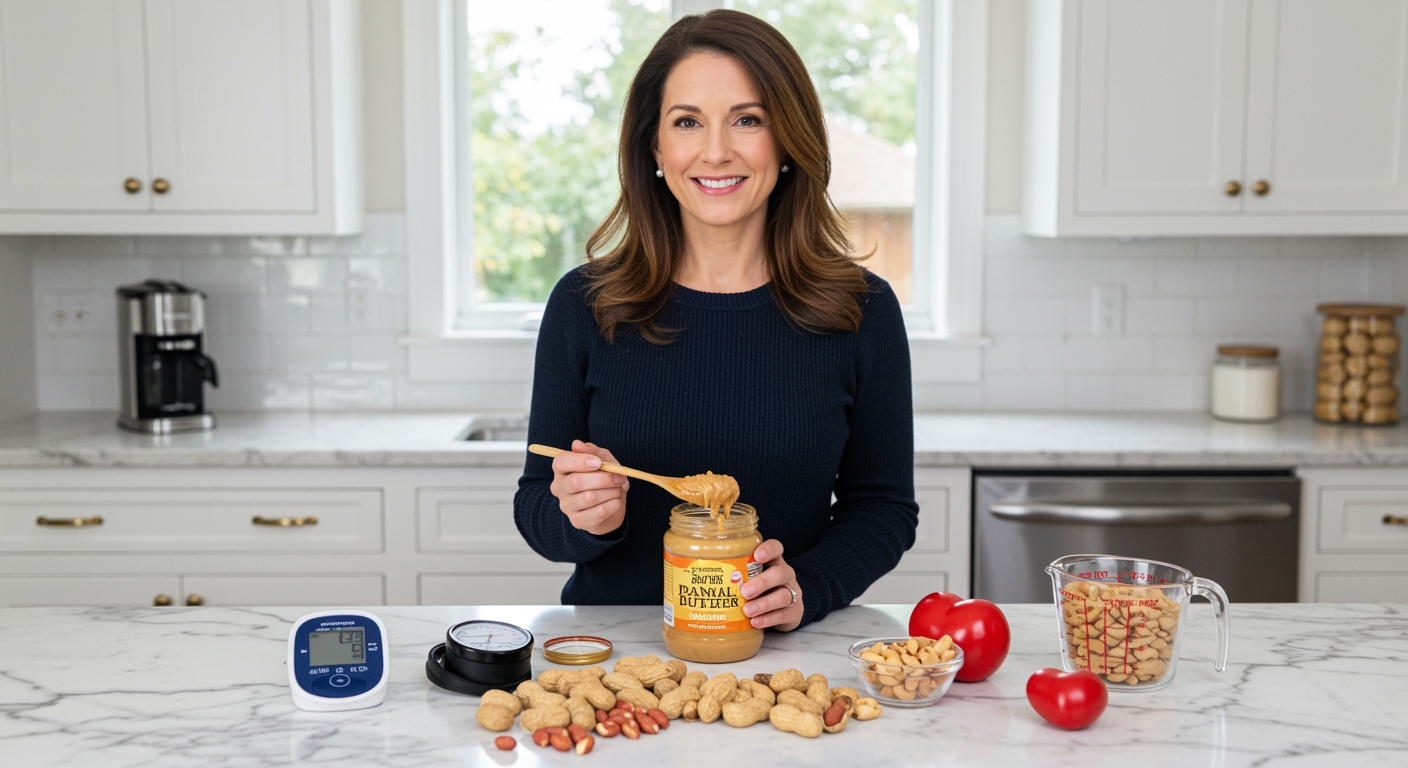✪ Key Takeaway: Natural peanut butter can help lower blood pressure due to healthy fats and potassium content.
Introduction
Your doctor just told you to watch your blood pressure and now you are staring at that jar of peanut butter in your pantry.
You might be wondering if your favorite spread is sabotaging your heart health goals or if it could actually help you manage your numbers.
Hi, I am Abdur, your nutrition coach and today I am going to explain exactly how peanut butter affects your blood pressure and what you need to know to make the right choice for your heart.
What Makes Peanut Butter Good or Bad for Blood Pressure?
The answer depends entirely on which type of peanut butter you choose.
Natural peanut butter contains monounsaturated fats that help relax blood vessel walls and improve circulation.
These healthy fats work by reducing inflammation in your arteries and making them more flexible.
However, processed peanut butter loaded with added sugars and hydrogenated oils tells a different story.
The added sugars cause blood sugar spikes that trigger inflammation throughout your cardiovascular system.
Hydrogenated oils contain trans fats that directly damage your blood vessel walls and increase arterial stiffness.
Research shows that people who consume natural nut butters have lower systolic blood pressure compared to those who avoid nuts entirely.
✪ Pro Tip: Always check the ingredient list and choose peanut butter with only peanuts and maybe salt listed.
How Does Potassium in Peanut Butter Help Your Heart?
Two tablespoons of natural peanut butter provide about 180 milligrams of potassium.
This mineral works as a natural diuretic that helps your kidneys flush out excess sodium from your bloodstream.
When sodium levels drop, your blood vessels can relax and your heart does not have to work as hard to pump blood.
Potassium also helps regulate the electrical signals that control your heartbeat rhythm.
Studies show that increasing potassium intake by just 1000 milligrams daily can reduce systolic blood pressure by 3-5 points.
The magnesium in peanut butter works alongside potassium to keep your blood vessels flexible and responsive.
This combination creates a powerful one-two punch against high blood pressure when consumed as part of a balanced diet.
✪ Fact: Peanut butter contains more potassium per serving than a banana.
Why Does Sodium Content Matter So Much?
Most commercial peanut butters contain 150-200 milligrams of added sodium per two-tablespoon serving.
This might seem small, but it adds up quickly when you consider your total daily sodium intake.
Excess sodium causes your body to retain water, which increases the volume of blood your heart must pump.
This extra fluid puts pressure on your blood vessel walls and forces your heart to work harder.
The American Heart Association recommends limiting sodium to 2300 milligrams daily for most adults.
People with high blood pressure should aim for even less, around 1500 milligrams per day.
Choosing unsalted natural peanut butter eliminates this concern completely while preserving all the heart-healthy benefits.
✪ Note: Unsalted natural peanut butter contains only 5 milligrams of naturally occurring sodium per serving.
Can Peanut Butter Help With Weight Management?
Maintaining a healthy weight is crucial for blood pressure control.
Natural peanut butter provides protein and healthy fats that help you feel satisfied for hours after eating.
This satiety effect prevents the blood sugar rollercoaster that leads to overeating and cravings.
The protein in peanut butter requires more energy to digest than carbohydrates, slightly boosting your metabolism.
Research indicates that people who include nuts and nut butters in their diet tend to have lower body weights over time.
However, portion control remains essential since peanut butter is calorie-dense at about 190 calories per two tablespoons.
The key is using peanut butter as a replacement for less nutritious foods rather than simply adding it to your current intake.
✪ Pro Tip: Measure your peanut butter portions with a tablespoon to avoid accidentally doubling your serving size.
What About the Arginine Connection?
Peanut butter contains arginine, an amino acid that your body converts into nitric oxide.
Nitric oxide acts as a powerful vasodilator, meaning it helps blood vessels relax and widen.
When your blood vessels are more relaxed, blood flows more easily and pressure on artery walls decreases.
This mechanism is the same one targeted by many blood pressure medications.
Studies show that arginine supplementation can reduce both systolic and diastolic blood pressure in people with hypertension.
Two tablespoons of peanut butter provide about 900 milligrams of arginine, which is a meaningful amount.
This natural approach to supporting blood vessel function makes peanut butter a valuable addition to a heart-healthy diet.
✪ Fact: Your body produces nitric oxide naturally, but arginine from foods helps boost this important process.
The Bottom Line
Natural peanut butter can be a heart-healthy addition to your diet when you choose the right type and control your portions.
The best foods for your health are often the simplest ones with the fewest ingredients, and this principle applies perfectly to peanut butter selection.
I would love to hear about your experience with peanut butter and blood pressure management, so please share your thoughts or questions in the comments below.
References
At NutritionCrown, we use quality and credible sources to ensure our content is accurate and trustworthy. Below are the sources referenced in creating this article:
- PMC: Peanut Consumption and Cardiovascular Health
- American Heart Association: Stroke Prevention Research
- Functional Foods in Health and Disease: Nutritional Benefits of Peanuts
- National Peanut Board: Heart Health Benefits





